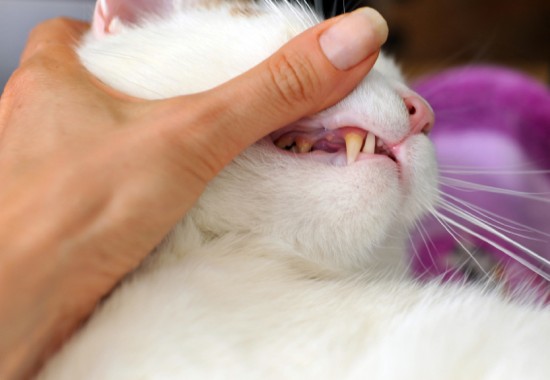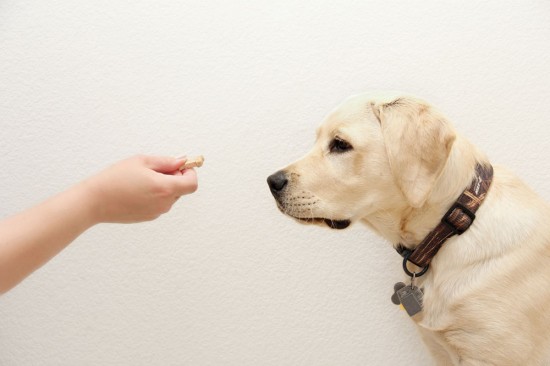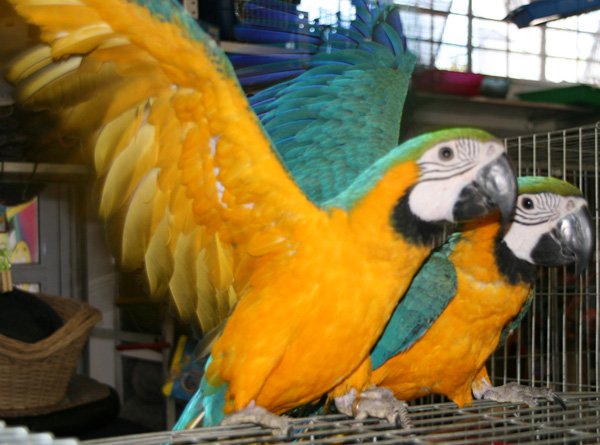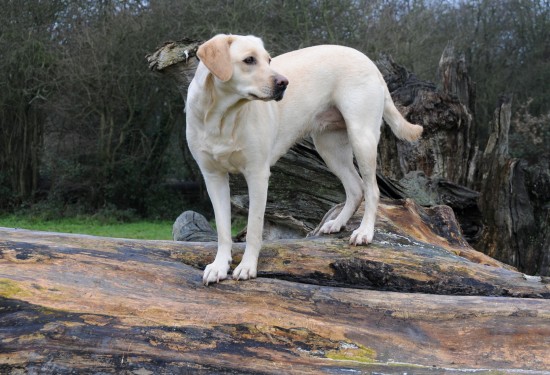
Training with treats and other food based rewards is a great way
to motivate your dog and speed the training process along. Most
dogs are highly motivated by food rewards, and treat training
using this kind of positive reinforcement is used to train all
sorts of animals, including tigers, lions, elephants and even
house cats.
Before you begin a treat based training session, however, it is
a good idea to test the dog to make sure that food will motivate
him through the session. Begin around the dog’s regular meal
time by taking a piece of its food and waving it in front of the
dog’s nose. If the dog shows an enthusiasm for the food, now is
a great time to start the training. If the dog shows little
interest, or none at all, it may be best to put off the training
until another time. Don’t be afraid to delay the start of meal
time in order to pique the dog’s interest in training. The
advantages of proper training will far outweigh any delay in
feeding.
It is generally best to get the dog used to regular feedings,
instead of leaving food out all the time. Not only does free
feeding encourage the dog to overeat and increase the chances of
obesity, but a free fed dog may never be fully motivated in
reward based training.
The come when called command Once your dog has shown interest in
the food offered to it, it is time to begin the training. Since
you already got your dog’s undivided attention by showing it
food, now is a great time to start. Give the dog a few pieces of
food right away, then back up a few steps. While holding the
food in your hand, so “come here”. When the dog comes to you,
praise him effusively and give him a few pieces of food.
After the dog is coming to you easily, add a sit command and
hold the collar before you give the food. After the sit command
is mastered, other commands, and even some tricks, can be added.
Food based positive reinforcement training is the best way to
teach a variety of important behaviors.
One good exercise is the sit, stay, come when called exercise.
This exercise can begin with the owner walking the dog, then
stopping and asking the dog to sit. After the dog is sitting
quietly, the owner backs away and asks the dog to stay. Ideally
the dog should continue to stay until called by the owner, even
if the leash is dropped. At the end of the exercise, the owner
calls the dog. When the dog comes to the owner, it receives food
and praise from the owner. This exercise should be repeated
several times, until the dog is reliably coming when called.
It is important to keep the training sessions short, especially
in the beginning, to keep the dog from becoming bored, and from
consuming its entire meal in the form of treats. After the dog
has been responding regularly, the treats and food rewards can
be slowly reduced. It is important to still provide these food
rewards, but it may no longer be necessary to provide as many.
After awhile, as well, it will not be necessary to give the dog
treats every single time he responds as requested. In general,
it should only be necessary for the dog to receive a food treat
one out of every five times he comes on demand. The other four
successes can be rewarded with praise and scratches.
Once the dog understand the basics of the “come here” exercise,
the basic exercise can be expanded, and many games can be
created. These type of games can be great fun for owner and dog
alike, as well as a great learning experience. Some off leash
work can be introduced as well, but it is always best to start
with the dog in a safe environment, such as a fenced back yard.
For variety, you can try taking the dog to other safe
environments, such as a friend’s house, a neighbor’s fenced yard
or a local dog park. Try turning the dog loose in these safe
places, and practice the come when called exercise. Always
praise the dog extensively, scratch him behind the ears and tell
him what a good dog he is. The goal should be to make coming to
the owner a more pleasant experience than whatever the dog was
doing before he was called.
 Dental Problems In Cats
Dental Problems I
Dental Problems In Cats
Dental Problems I
 Four Simple Steps For Getting Your Dog’s Attention
Four Simple Steps
Four Simple Steps For Getting Your Dog’s Attention
Four Simple Steps
 Seven Interesting Facts About Labradors
Seven Interesting
Seven Interesting Facts About Labradors
Seven Interesting
 Discover the many joys and pleasures of sending cute puppy pictures
Discover the many joys and pleasures of sending cute puppy
Discover the many joys and pleasures of sending cute puppy pictures
Discover the many joys and pleasures of sending cute puppy
 Cranial Cruciate Ligament Rupture In Dogs
Cranial Cruciate
Cranial Cruciate Ligament Rupture In Dogs
Cranial Cruciate
Copyright © 2005-2016 Pet Information All Rights Reserved
Contact us: www162date@outlook.com